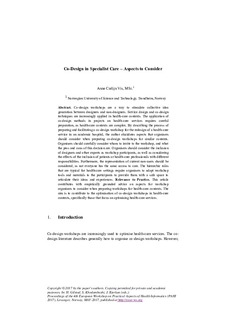Co-design in specialist care - aspects to consider
Journal article, Peer reviewed
Published version
Permanent lenke
http://hdl.handle.net/11250/2467945Utgivelsesdato
2017Metadata
Vis full innførselSamlinger
- Institutt for design [1151]
- Publikasjoner fra CRIStin - NTNU [38685]
Originalversjon
CEUR Workshop Proceedings. 2017, .Sammendrag
Co-design workshops are a way to stimulate collective idea generation between designers and non-designers. Service design and co-design techniques are increasingly applied in health-care contexts. The application of co-design methods in projects on health-care services requires careful preparation, as health-care contexts are complex. By describing the process of preparing and facilitating a co-design workshop for the redesign of a health-care service in an academic hospital, the author elucidates aspects that organisers should consider when preparing co-design workshops for similar contexts. Organisers should carefully consider whom to invite to the workshop, and what the pros and cons of this decision are. Organisers should consider the inclusion of designers and other experts as workshop participants, as well as considering the effects of the inclusion of patients or health-care professionals with different responsibilities. Furthermore, the representation of current non-users should be considered, as not everyone has the same access to care. The hierarchic roles that are typical for health-care settings require organisers to adapt workshop tools and materials to the participants to provide them with a safe space to articulate their ideas and experiences. Relevance to Practice. This article contributes with empirically grounded advice on aspects for workshop organisers to consider when preparing workshops for health-care contexts. The aim is to contribute to the optimisation of co-design workshops in health-care contexts, specifically those that focus on optimising health-care services.
